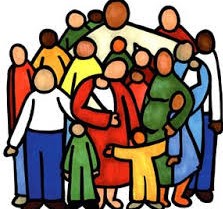Solemnity of the Most Holy Body and Blood of Christ
“The bread that I will give is my flesh for the life of the world.” Jn. 6:51
Mohandas Gandhi once said that “If Christ ever comes to India, he’d better come as bread.”
What he was referring to, of course, is that of the 7 billion people alive on the planet, at least 1.5 billion, more than 20%, subsist below the internationally accepted poverty line of $1.25 a day. World-wide, every single day almost 16,000 children die from hunger-related causes!
According to Bread for the World, a Christian group urging our nation’s leaders to end hunger at home and abroad, in the United States 1 of every 4 children are “at risk of hunger,” and more than 1 of every 5 children live in households that “struggle to put food on the table.”
John’s gospel presents many images that give us a sense of the wondrous totality of the saving power of Jesus Christ, the messenger from the Father who responds completely to the most fundamental needs of human existence.
For example, when Jesus speaks of our need to find a way out of the darkness of despair and tragedy, he presents himself as the “light of the world.”
When Jesus speaks of how desperately we need to find the passageway to the fulfillment of our deepest longings to love and be loved, he presents himself as “the gate.”
When Jesus speaks of how vulnerable we are and how much we need protection, he presents himself as the “good shepherd.”
And when Jesus speaks of our hunger, not only our hunger for food and drink, but also our hunger to be respected as dear and lovable, he speaks of himself as the “bread of life.” He tells us further that “whoever comes to me will never be hungry.”
Even more remarkable is that the gospel of John presents Jesus’ image of himself as bread and wine so nakedly that it scandalizes some of his followers:
“How can this man give us his flesh to eat?”
But Jesus asserts even more strongly:
“Unless you eat the flesh of the Son of Man and drink his blood, you do not have life within you.”
What he’s saying with these shocking words is:
“Don’t just ‘believe’ in me. Consume me. Absorb me.”
The reward will be the promise of Jesus Christ’s abiding presence within you – the nourishment that will fulfill all your deepest needs – forever.
This is what the eucharist that we celebrate together is all about.
St. Paul, in our second reading today, tells us clearly that the cup we share is “a participation in the blood of Christ.” He tells us that the bread we break is “a participation in the body of Christ.”
Think of it:
When we eat and drink the body and blood of Christ it’s almost as though we are affected at the molecular level of our beings – if we allow it. We are then able to say with St. Paul, “I live now, not I, but Christ who lives in me.”
This is what the eucharist offers us:
The dynamism, the new-found energy to live out the command to become Christ’s “flesh for the life of the world.”
St. Theresa of Avila said it, with crystal clarity, this way:
“Christ has no body now but yours, no hands but yours, no feet but yours. You are the eyes through which Christ’s compassion looks out on the world.”
We have eaten. Now let us go and “come as bread” for the world.
Ted Wolgamot, Psy.D.







